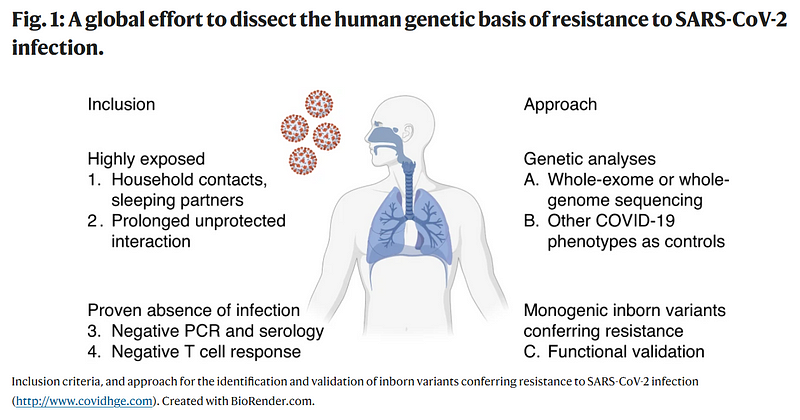Exploring Genetic Resistance to COVID-19: A Deep Dive
Written on
Chapter 1: Understanding COVID-19 Resistance
The question of whether genetic resistance to COVID-19 exists has captured the attention of researchers worldwide. A significant initiative known as the COVID Human Genetic Effort has been launched to delve into this inquiry.
Since the World Health Organization declared COVID-19 a pandemic nearly 20 months ago, the world has witnessed ongoing challenges with rising infections and fatalities. We have gained substantial insights into the virus and developed various treatment modalities. Among the pressing issues are the long-lasting effects known as Long COVID, which continue to afflict many survivors for extended periods.
Conversely, there are intriguing cases of asymptomatic individuals who contract the virus yet display no symptoms. Recent studies from the UK compared these asymptomatic cases to those who developed severe COVID-19 but had no pre-existing health conditions. Findings revealed a notable prevalence of a specific gene, HLA-DRB1*04:01, in asymptomatic individuals.
As research progresses, it is crucial to also highlight advancements in treatment. Following the success of mRNA vaccines, scientists are now making headway in developing oral medications, which could prove advantageous for individuals averse to injections and help alleviate the burden on healthcare systems.
Merck has announced plans to seek U.S. authorization for its oral antiviral medication, molnupiravir, while Pfizer has also revealed promising results from its clinical trials for an anti-COVID pill. Such developments enhance our arsenal against COVID-19, ultimately aiming to shield individuals from severe outcomes.
Returning to the genetic inquiry, an international collaboration is underway to investigate whether particular genetic traits may provide resistance to SARS-CoV-2. This research could clarify why some individuals experience severe illness while others maintain natural immunity.
This line of investigation is not unprecedented. In 1994, researchers explored genetic resistance to HIV and identified a single mutation that offered significant protection, leading to the creation of antiviral therapies.

Chapter 2: The Genetics Behind COVID-19 Resistance
COVID-19 has exhibited unpredictable patterns of infection; individuals within the same household often experience vastly different reactions. While it is well-established that older adults and those with underlying health issues are at heightened risk, this does not fully explain the variability in responses.
Researchers suspect that unique genetic factors may play a critical role in explaining why some individuals are resistant to COVID-19, exhibiting no symptoms even after high exposure. To investigate this, scientists have focused on individuals likely exposed to the virus but who remain symptom-free.
They have specifically examined household contacts of confirmed cases, especially discordant couples—where one partner shows symptoms while the other remains asymptomatic yet tests negative for the virus. This suggests that the latter has not contracted the virus despite significant exposure.
The COVID Human Genetic Effort has detailed its research strategy in an article published in Nature Immunology, drawing parallels to earlier studies on HIV resistance that spurred the development of new therapies.
Preliminary findings from a cohort of 86 discordant couples indicate that resistance may not stem from a single gene variant but rather a combination of variants that enhance immune cell activity. The ongoing study has enrolled over 400 participants, with results available on the preprint server medRxiv.
This video discusses the genetic factors that contribute to COVID-19 severity, shedding light on why some individuals face heightened risks.
In this video, researchers explore variants that may explain the remarkable COVID-19 resistance seen in centenarians, offering insights into potential genetic protections.
Stay informed with the content that matters — Join my mailing list